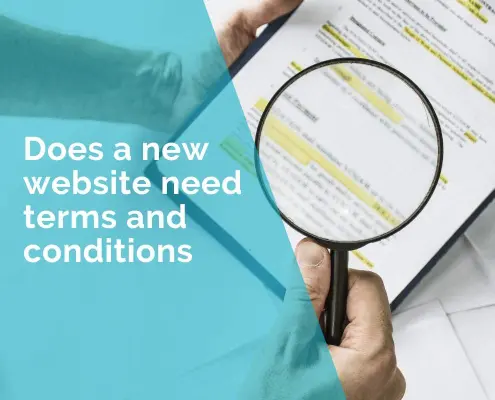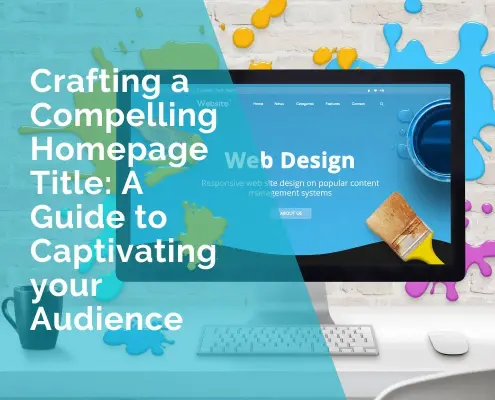Blogging for Business: Why Every Business Needs a Blog
In the digital world we live in, every business should have a blog – it’s no longer a choice, but a must-have.
If you’re wondering how a blog can elevate your brand, drive traffic, and increase revenue, you’re in the right place. From building credibility to enhancing customer relationships, I’m here to guide you through the essentials of blogging for business.
The Power of Online Visibility
Discussing the Impact of Digital Footprint
Think of your digital footprint as the trail of breadcrumbs that leads potential customers straight to your door. When you have a blog, it’s like leaving a trail of these breadcrumbs all over the internet. Every post, every piece of content you create adds up, creating a pathway that not only attracts attention but also guides people right to your business.
Example: Consider a local bakery sharing weekly blogs about new recipes, baking tips, and stories behind the scenes. This digital trail not only engages the local community but also attracts dessert enthusiasts worldwide, expanding the bakery’s reach far beyond its physical location.
Connecting with a Global Audience
Having a blog transforms your business into a 24/7 global ambassador. It’s like having a round-the-clock spokesperson, ready to share your story with anyone, anywhere, at any time. The internet doesn’t sleep, and neither does the potential for your business to reach new audiences, breaking geographical barriers.
Example: Picture a boutique travel agency that blogs about unique destinations, travel hacks, and local experiences. Through their blog, they connect with travel enthusiasts worldwide, turning dream vacations into booked flights and hotel reservations.
Building Brand Recognition through Online Channels
Your brand is like a familiar face in a sea of strangers. A blog serves as your brand’s megaphone, broadcasting its personality, values, and expertise. Consistent, quality content not only establishes your business as an authority but also engrains your brand into the minds of your audience, fostering recognition and trust.
Example: Imagine a tech startup sharing insightful blogs on industry trends, product developments, and user stories. This consistent online presence not only positions them as thought leaders but also solidifies their brand in the tech community, attracting potential clients and partnerships.
In essence, the power of online visibility through blogging propels your business into the spotlight, forging connections, and ensuring that your brand’s voice echoes far and wide.

“In the online world, businesses need a blog to connect with people. It’s not just words on a page; it’s like having a chat with your audience. Blogging helps your brand be known and remembered.”
Ivana Katz
Establishing Authority and Credibility
In the world of business, being seen as an expert is like having a golden ticket – it opens doors and builds trust faster than anything else. Now, let’s uncover why blogging for business is your golden ticket to establishing authority and credibility in your industry.
The Role of Blogging in Demonstrating Industry Expertise
Think of your blog as a stage where you showcase your expertise, much like a skilled musician playing their best tunes. Regularly sharing valuable insights, tips, and industry updates positions your business as the go-to source for information. Over time, your blog becomes a virtual stage where you confidently stand as an expert in your field, attracting an audience eager to learn from your mastery.
Example: Imagine a financial consulting firm consistently offering blogs about the latest market trends, investment strategies, and financial planning tips. Their blog becomes a go-to resource for individuals seeking financial guidance, establishing the firm as an authority in the finance industry.
Showcasing Company Knowledge and Thought Leadership
Blogging allows you to share your insights, experiences, and innovative ideas. It’s not just about what your business does but how it thinks – positioning your company as a thought leader, setting trends rather than following them.
Example: Consider a software development company sharing blogs about emerging technologies, coding best practices, and solutions to common challenges. Their thought-provoking content not only attracts developers seeking valuable information but positions the company as a leader in the ever-evolving tech landscape.
Gaining Trust and Confidence from Potential Customers
Building trust is like constructing a sturdy bridge between your business and potential customers. Blogging acts as the foundational material for this bridge, offering transparency and authenticity. When customers see your commitment to sharing knowledge and solving their problems through your blog, trust blossoms, and confidence in your products or services solidifies.
Example: Picture an organic skincare brand consistently providing blogs on natural ingredients, skincare routines, and addressing common skin concerns. Through their informative content, they not only educate their audience but also gain the trust of individuals seeking reliable and caring skincare solutions.
In essence, establishing authority and credibility through blogging is like stepping into the spotlight, confidently showcasing your expertise and knowledge. It’s not just about selling; it’s about becoming a trusted advisor in your industry.

Boosting SEO and Organic Traffic
Understanding the Connection Between Blogging and Search Engine Optimization (SEO)
When you create blog posts with relevant keywords, you’re essentially telling search engines, “Hey, my business is an expert on this topic!” This boosts your website’s ranking, making it more likely for people to find you when they search online.
Example: Imagine a gardening supply store creating blogs about seasonal gardening tips, plant care, and DIY projects. By incorporating keywords like “best garden tools” and “organic fertilizers,” they enhance their SEO, making it easier for green-thumbed enthusiasts to find their website.
The Long-Term Benefits of Consistent, Quality Content
Regularly publishing quality blog content allows you to not just attract visitors, but also to keep them around. Search engines love this! The more valuable content you have, the more likely your website becomes a trusted resource. It’s not just a short-term boost; it’s a long-term investment in the growth of your online presence.
Example: Consider an online fitness platform consistently delivering blogs on workout routines, nutrition tips, and wellness advice. Over time, their library of quality content not only attracts new fitness enthusiasts but also retains a loyal audience, establishing them as an authoritative voice in the fitness industry.
Driving Organic Traffic to Your Website
Picture your website as a bustling marketplace. Now, imagine each blog post as a friendly guide, directing people to different sections of your market. Blogging is your way of inviting visitors in and showing them around, creating a pathway for organic traffic to flow naturally. The more people you attract through your blog, the more likely they are to explore your offerings and become customers.
Example: Envision an e-commerce fashion brand creating blogs on style trends, fashion tips, and outfit inspirations. Each blog post becomes a virtual guide, leading fashion enthusiasts to explore the latest collections on their website, ultimately driving organic traffic and increasing potential sales.
In essence, boosting SEO and organic traffic through blogging is like turning on a beacon that attracts visitors to your digital storefront. It’s not just about being present online; it’s about being the go-to destination in your niche.
Engaging with Your Audience
In the digital world, your business isn’t just a static entity; it’s an active participant in a continuous conversation. Let’s delve into how blogging transforms your brand into an interactive platform, fostering meaningful connections with your audience.
Creating a Two-Way Communication Channel
Blogs aren’t one-sided monologues; they’re invitations for your audience to join the discussion. By maintaining a blog, your business opens a direct line of communication. It’s not just about delivering messages; it’s about creating a space where your audience can share their thoughts. Through blog posts, you establish a dynamic environment where customers feel heard and engaged.
Encouraging User Interaction and Comments
Interaction is the heartbeat of engagement. Blogs provide a space for readers to interact – whether through comments, sharing on social media, or expressing their opinions. Actively encouraging and participating in these interactions creates a dialogue. Responding to comments, addressing queries, and appreciating feedback all contribute to building a sense of community around your content.
Fostering a Community Around Your Brand
Beyond individual interactions, blogging for business helps cultivate a communal spirit. Regular, valuable content becomes a magnet, drawing like-minded individuals to your brand. A consistent blog creates not just readers but a community of followers. This community, connected by shared interests and values, transforms your brand from a mere provider into a hub for those who resonate with your message.

Transforming Leads into Loyal Customers
In the world of business, turning potential customers into loyal advocates is akin to turning curious window shoppers into dedicated patrons. Let’s dive into how blogging acts as the guide in this journey, transforming leads into loyal customers.
The Sales Funnel: From Awareness to Conversion
Imagine your business as a guide, leading customers through a journey from first glance to long-term commitment. This journey is the sales funnel. At the top, there’s awareness – people discovering your brand. In the middle, there’s a consideration – potential customers exploring your offerings. Finally, at the bottom, there’s conversion – turning interested parties into loyal customers. Blogging strategically aligns with each stage, creating content that introduces, educates, and convinces.
Example: Consider an online fitness brand. At the awareness stage, they may publish blogs on beginner-friendly workouts. In the consideration stage, they delve into in-depth guides on nutrition and diverse workout routines. Finally, at the conversion stage, they showcase success stories and testimonials, convincing potential customers to commit to their fitness programs.
Using Blogging to Nurture Leads Through the Customer Journey
Blogging isn’t just about attracting new faces; it’s about nurturing those relationships over time. Think of it as tending to a garden – you plant the seeds with informative content and patiently nurture them as they grow into fully bloomed customers. Throughout the customer journey, your blog provides valuable information, addresses concerns, and showcases the unique value your business brings.
Example: Picture an e-commerce fashion brand. In the early stages, they may blog about style trends and outfit inspiration, creating awareness. As customers move through the journey, the blog evolves to include sizing guides and customer reviews, addressing concerns. Finally, at the conversion stage, they highlight exclusive offers and loyalty programs, encouraging repeat purchases.
Case Studies and Success Stories
Nothing speaks louder than success. Case studies and success stories are like trophies on your business’s shelf – proof that your products or services deliver real results. Blogs provide the perfect space to showcase these stories, creating a compelling narrative that resonates with potential customers and instils confidence in your brand.
Example: Think of a software development company publishing blogs about their successful collaborations with clients. These case studies detail challenges faced, solutions provided, and the positive outcomes achieved. Prospective clients reading these blogs gain insights into the company’s capabilities and are more likely to convert.
In essence, transforming leads into loyal customers through blogging is about being the trusted companion in their journey. It’s about providing the right information at the right time, building a relationship that goes beyond a transaction, and ultimately creating a customer base that chooses your brand time and again.

Cost-Effective Marketing Strategy
Comparing the Cost of Blogging to Traditional Marketing Channels
Traditional marketing methods like TV or radio ads often require a significant financial commitment. In contrast, blogging offers a more budget-friendly approach. The costs associated with maintaining a blog, such as website hosting and content creation, are generally lower than producing traditional advertisements. Additionally, the sustained visibility of blog content over time makes it a cost-effective option compared to short-lived traditional campaigns.
Maximizing ROI Through Content Creation
Return on Investment (ROI), a critical measure in marketing success, can be efficiently maximized through strategic content creation in blogging. Each blog post acts as a valuable asset, continuously working to attract, engage, and convert potential customers. The cumulative impact of a well-maintained blog is akin to compounding returns, offering an ongoing source of inbound traffic. This sustained value not only reduces reliance on paid advertising but also ensures lasting returns on the initial investment in content creation.
Long-Term Benefits of Evergreen Content
Evergreen content, characterized by its enduring relevance, plays a pivotal role in the sustained success of a blogging-driven marketing strategy. Unlike time-sensitive promotional materials, evergreen blog content remains valuable and applicable regardless of when it was published. This sustained relevance contributes to consistent organic traffic, attracting new audiences long after the initial publication date.
The lasting nature of evergreen content aligns with changing consumer behaviours and search patterns, offering enduring visibility in search engine results. This consistent presence establishes a brand as a trustworthy and credible source within its industry, contributing to long-term benefits beyond immediate marketing campaigns. Ultimately, the details of a cost-effective marketing strategy through blogging involve both initial budget considerations and the continuous, enduring impact of strategic content creation. Blogging’s ability to provide continuous value, attract organic traffic, and establish a lasting digital footprint positions it as a strategic cornerstone in modern marketing approaches.
Overcoming Common Objections
In the realm of adopting blogging as a business strategy, addressing common objections involves navigating concerns, showcasing flexibility, and dispelling misconceptions. Let’s delve into the details of overcoming these objections in a straightforward manner.
Addressing Concerns About Time and Resources
One common objection to blogging is the perceived demand on time and resources. However, a closer look reveals that efficient planning and prioritization can significantly mitigate these concerns. Businesses can allocate dedicated time for content creation, set realistic publishing schedules, and leverage available resources smartly. The key lies in recognizing that consistent and quality content, even with limited resources, can yield substantial long-term benefits.
Highlighting the Flexibility and Scalability of Blogging
Flexibility is a significant advantage of blogging that often addresses objections related to rigid commitments. Blogging allows businesses to adapt to their unique schedules and capacities. It’s not a one-size-fits-all approach but can be tailored to suit the specific needs and capacities of a business. Additionally, the scalability of blogging is worth noting. Whether you’re a small startup or a large enterprise, the scalability of blogging means you can start small and gradually expand your efforts as your resources and audience grow.
Debunking Myths About the Effectiveness of Blogging for Businesses
Misconceptions about the effectiveness of blogging may act as barriers to its adoption. Debunking these myths involves showcasing tangible results and real-world examples. Blogs are not merely digital diaries; they are powerful tools that contribute to brand visibility, audience engagement, and conversion. By presenting case studies, success stories, and data-backed evidence, businesses can debunk myths and illustrate the genuine impact of blogging on achieving business goals.
In essence, overcoming objections to blogging involves practical solutions, emphasizing flexibility, and dispelling myths through concrete examples. By addressing concerns head-on and showcasing the adaptability and effectiveness of blogging, businesses can make informed decisions about incorporating this powerful strategy into their overall marketing approach.
Blogging isn’t just a trend; it’s a smart move for businesses today. It helps them be seen online, show expertise, connect with customers, and turn interested people into loyal customers—all without breaking the bank. Addressing worries about time and resources, blogging is flexible and can grow with the business. By sharing stories and useful information, businesses create a strong online presence. So, it’s not just about writing a blog; it’s like telling the story of the business online, making connections, and setting the stage for lasting success. Blogging is a journey where businesses can share, connect, and thrive in the digital world.
Frequently Asked Questions
Why should my business have a blog?
Having a blog provides a platform to showcase your expertise, connect with your audience, and boost your online visibility. It’s a powerful tool to share valuable content and build a strong online presence.
Is blogging only for large businesses?
No, blogging is beneficial for businesses of all sizes. Small and medium-sized enterprises can use blogging to establish themselves as industry experts, engage with their audience, and compete effectively in the digital space.
How often should I publish blog posts?
The frequency of blog posts depends on your resources and goals. Consistency is key, so aim for a schedule that you can sustain. Whether it’s weekly, bi-weekly, or monthly, regular updates keep your audience engaged.
Does blogging help with search engine optimization (SEO)?
Yes, blogging significantly contributes to SEO. Search engines love fresh, relevant content. Regularly updating your blog with quality content helps improve your website’s search engine rankings and visibility.
Can I use my blog to promote products or services?
Absolutely. While providing valuable content, you can also showcase your products or services in a non-intrusive way. Blogs are a great platform to inform your audience about what you offer and how it can benefit them.
How can blogging help in building brand authority?
By consistently sharing insightful and valuable content, your blog positions your business as an authority in your industry. Over time, this builds trust and credibility among your audience.
Do I need to be a skilled writer to start a blog for my business?
While good writing helps, you don’t need to be a professional writer. Authenticity and clarity are more important. Focus on delivering valuable information in a way that resonates with your audience.
How do I measure the success of my business blog?
rack key metrics such as website traffic, engagement (comments, shares), and conversion rates. Monitor the performance of individual blog posts to understand what resonates with your audience.
Can I repurpose blog content for other marketing channels?
Absolutely. Repurposing blog content into social media posts, newsletters, or even video content extends its reach. It allows you to maximize the value of your initial effort.
 Ivana Katz from Websites 4 Small Business is an award winning web designer who builds websites that build your business. She provides unbeatable web design services to fit your budget.
Ivana Katz from Websites 4 Small Business is an award winning web designer who builds websites that build your business. She provides unbeatable web design services to fit your budget.
The end result? Professional, custom-made sites that give your business the extra oomph it needs to stand out from the competition and make an impact.
Whether you’re a brand-new business or an established one ready to improve your digital presence, Ivana makes it easy to get your business online very quickly. Her websites are professional, tailored to fit your budget, and give your business a serious boost.
Download your FREE copy of “Ultimate Website Design Secrets Blackbook – 10 Bulletproof Strategies for Designing an Outrageously Successful Website”












